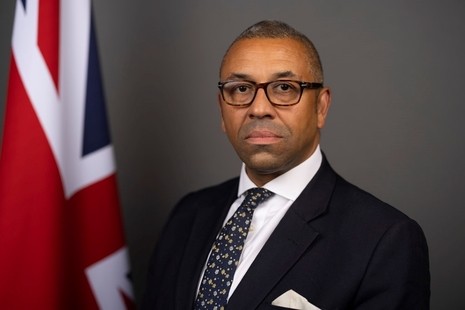By Ben Kerrigan-
The UK government has retreated from its controversial plan to significantly raise the income threshold required for Britons to bring foreign family members to live in the country.
The initial proposal, championed by Home Secretary James Cleverly, aimed to hike the threshold from £18,600 to £38,700 as part of broader measures to curb legal migration.
However, amid mounting criticism and concerns about the potential disruption to families, the government has now confirmed a scaled-back increase to £29,000, scheduled for implementation in the spring.
The abrupt backtrack follows the release of record net migration figures for 2022, totaling 745,000, as reported by the Office for National Statistics.
This surge prompted the government to reconsider its approach to migration control, leading to the now-revised income threshold. While the government asserts that these changes will result in a substantial reduction in net migration, critics argue that the initial £38,700 threshold was unworkable and point to potential flaws in the government’s judgment.
The initial proposal to increase the income threshold to £38,700 faced widespread backlash as it was seen as a threat to families, with many facing an uncertain future.
Critics argued that the proposal risked tearing families apart and added to the anxiety of those directly impacted. The reversal, driven by concerns about the policy’s humanitarian implications, reflects the government’s responsiveness to public sentiment and its recognition of the need for a more measured approach.
Home Office minister Lord Sharpe of Epsom confirmed the change in plans, emphasizing that the original £38,700 threshold would have restricted the right to bring foreign family members to only 30% of the working population, compared to the current 75% under the £18,600 threshold.
Lord Sharpe outlined the new approach, stating that in spring 2024, the threshold would be raised to £29,000, gradually progressing to the 40th percentile (£34,500) and finally reaching the 50th percentile (£38,700) – the level at which the general skilled worker threshold is set.
Despite the revision, questions linger about the potential implications of the policy backtrack and whether it exposes a lack of foresight or poor judgment in the formulation of the original law.
The government’s decision to revise the income threshold raises broader questions about the economic and social implications of migration policies.
Home Secretary, James Cleverly, (pictured) argued that the revised plan would still result in a significant reduction in net migration, with around 300,000 fewer people coming to the UK compared to the previous year.
However, concerns persist about the economic impact, and the opposition has called for transparency regarding advice from the Treasury and the Office for Budget Responsibility on the economic ramifications of these changes.
The Liberal Democrats have been vocal in their criticism, asserting that the £38,700 threshold was always “unworkable.” Alistair Carmichael, the party’s home affairs spokesman, urged the government to involve experts in decision-making and called for the publication of advice regarding the economic impact of the proposed changes.
Political Fallout and Reactions
Shadow Home Secretary Yvette Cooper seized on the policy reversal as “more evidence of Tory government chaos on immigration and the economy.” She highlighted the government’s failure to consult stakeholders on the initial proposals and its apparent lack of consideration for the impact on families.
The Labour Party argues that the government’s approach to immigration lacks a comprehensive plan, particularly in linking the immigration system to training and workforce planning.
While initial reactions from the Tory right appeared negative, with Conservative former minister Jonathan Gullis expressing disappointment and stating that legal migration to the UK is “too high and unsustainable,” the government maintains that the revised plan strikes a balance between immigration control and humanitarian considerations.
The decision to backtrack on the original plan shows the importance of considering the human impact of policy changes, particularly those affecting families.
While the government asserts that the revised policy will still contribute to a substantial reduction in net migration, the opposition and critics remain vigilant, calling for transparency and a more holistic approach to immigration reform.




